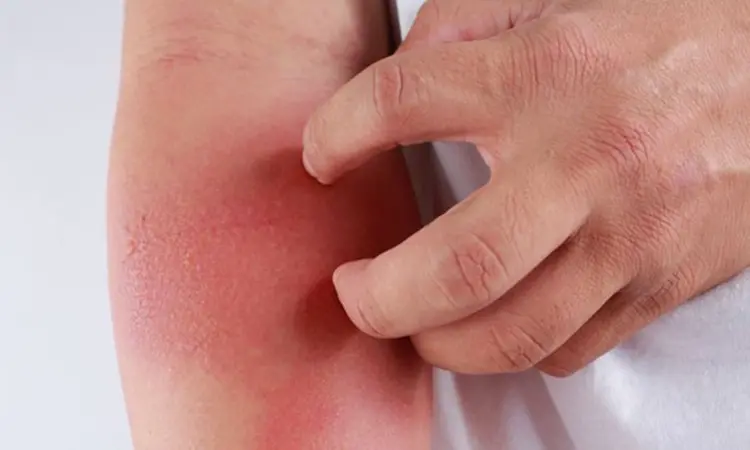- Home
- Medical news & Guidelines
- Anesthesiology
- Cardiology and CTVS
- Critical Care
- Dentistry
- Dermatology
- Diabetes and Endocrinology
- ENT
- Gastroenterology
- Medicine
- Nephrology
- Neurology
- Obstretics-Gynaecology
- Oncology
- Ophthalmology
- Orthopaedics
- Pediatrics-Neonatology
- Psychiatry
- Pulmonology
- Radiology
- Surgery
- Urology
- Laboratory Medicine
- Diet
- Nursing
- Paramedical
- Physiotherapy
- Health news
- Fact Check
- Bone Health Fact Check
- Brain Health Fact Check
- Cancer Related Fact Check
- Child Care Fact Check
- Dental and oral health fact check
- Diabetes and metabolic health fact check
- Diet and Nutrition Fact Check
- Eye and ENT Care Fact Check
- Fitness fact check
- Gut health fact check
- Heart health fact check
- Kidney health fact check
- Medical education fact check
- Men's health fact check
- Respiratory fact check
- Skin and hair care fact check
- Vaccine and Immunization fact check
- Women's health fact check
- AYUSH
- State News
- Andaman and Nicobar Islands
- Andhra Pradesh
- Arunachal Pradesh
- Assam
- Bihar
- Chandigarh
- Chattisgarh
- Dadra and Nagar Haveli
- Daman and Diu
- Delhi
- Goa
- Gujarat
- Haryana
- Himachal Pradesh
- Jammu & Kashmir
- Jharkhand
- Karnataka
- Kerala
- Ladakh
- Lakshadweep
- Madhya Pradesh
- Maharashtra
- Manipur
- Meghalaya
- Mizoram
- Nagaland
- Odisha
- Puducherry
- Punjab
- Rajasthan
- Sikkim
- Tamil Nadu
- Telangana
- Tripura
- Uttar Pradesh
- Uttrakhand
- West Bengal
- Medical Education
- Industry
Secukinumab Reduces Psoriasis Itch and Restores Nerve Architecture, Study Finds

Germany: A recent study, PSORITUS, revealed the efficacy of Secukinumab (SEC), a biologic therapy, in significantly reducing pruritus (itch) associated with psoriasis while regenerating the cutaneous nerve architecture and improving skin health. The double-blind, placebo-controlled, Phase IIIb randomized withdrawal trial highlights the multifaceted benefits of SEC for individuals with psoriasis, a chronic inflammatory skin condition.
"SEC outperformed placebo by effectively reducing pruritus intensity, restoring clinical normalcy to skin lesions, and reversing histopathological abnormalities. Additionally, SEC promoted neuroanatomical recovery, which remained stable even after treatment withdrawal," the researchers wrote in Acta Dermato-Venereologica.
Pruritus in psoriasis was once thought to be less prevalent than it is, yet it poses a significant burden on patients. While Secukinumab, a monoclonal anti-interleukin-17A antibody, is known to effectively control the signs of psoriasis, its impact on pruritus and cutaneous neuroanatomy has not been fully understood.
To fill this knowledge gap, Lina Renkhold, Department of Dermatology, University Hospital Münster, Münster, Germany; Center for Chronic Pruritus, University Hospital Münster, Münster, Germany, and colleagues aimed to assess the superiority of SEC treatment over placebo in reducing pruritus intensity, measured by the visual analog scale (VAS). Additionally, the study examined the relationship between treatment and the progression of pruritus in relation to the absolute Psoriasis Area Severity Index (PASI) score and changes in cutaneous histopathology and neuroanatomy.
For this purpose, the researchers administered open-label SEC 300 mg subcutaneously at regular intervals until week 16. Patients who achieved a ≥98% reduction in PASI (PASI ≥98) were then randomized to receive either placebo or SEC treatment until week 32. Punch biopsies were obtained from lesional psoriatic (at baseline, weeks 16, and 32) and non-lesional (at baseline) skin for histopathological and neuroanatomical analysis.
The study led to the following findings:
- VAS scores showed significant improvement after open-label SEC treatment but relapsed upon placebo (29.92 ± 33.8) compared to SEC (12.30 ± 22.6).
- After SEC-induced improvement in PASI, histopathology, marker expression, and neuroanatomy, relapse was observed upon treatment discontinuation in all parameters except for neuroanatomy.
The PSORITUS study emphasizes the potential of Secukinumab potential as a comprehensive treatment for psoriasis, addressing both visible symptoms and underlying structural abnormalities.
"These results pave the way for future research into IL-17A inhibitors and their broader implications in dermatological and neurological disorders. For psoriasis patients, SEC offers renewed hope for improved skin health and lasting relief from the discomfort of pruritus," the researchers concluded.
Reference:
Renkhold, L., Pereira, M. P., Loser, K., Metze, D., Baeumer, D., Melzer, N., … Ständer, S. (2024). Secukinumab Reduces Psoriasis-associated Pruritus and Regenerates the Cutaneous Nerve Architecture: Results from PSORITUS a Doubleblind, Placebo-controlled, Randomized Withdrawal Phase IIIb Study. Acta Dermato-Venereologica, 104, adv40737. https://doi.org/10.2340/actadv.v104.40737
Dr Kamal Kant Kohli-MBBS, DTCD- a chest specialist with more than 30 years of practice and a flair for writing clinical articles, Dr Kamal Kant Kohli joined Medical Dialogues as a Chief Editor of Medical News. Besides writing articles, as an editor, he proofreads and verifies all the medical content published on Medical Dialogues including those coming from journals, studies,medical conferences,guidelines etc. Email: drkohli@medicaldialogues.in. Contact no. 011-43720751


